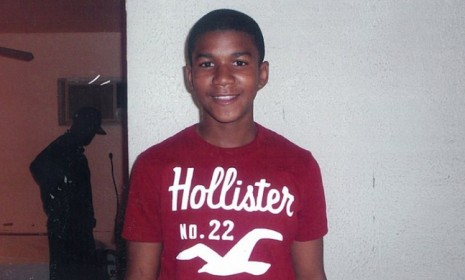Why Trayvon Martin's killer isn't under arrest: 3 theories
A self-styled neighborhood security guard shot and killed an unarmed black youth — and might very well avoid punishment

A free daily email with the biggest news stories of the day – and the best features from TheWeek.com
You are now subscribed
Your newsletter sign-up was successful
On Feb. 26, 17-year-old Trayvon Martin was shot dead in Sanford, Fla., by self-appointed neighborhood watchman George Zimmerman, 28. Martin, who is black, was walking from 7-Eleven to his father's fiancée's home in the Orlando-area gated community, carrying a pack of Skittles, a can of iced tea, and his cellphone. According to 911 tapes reluctantly released by Sanford police on March 16, Zimmerman told police dispatchers he was concerned about a "real suspicious guy," a "black male" walking around the neighborhood. "These assholes always get away," he added, before chasing after Martin, despite the dispatcher telling him not to. A scuffle of some kind ensued, followed by screaming and a gunshot. Late March 19, following a days-long outcry, Florida state law enforcement and the FBI said they would open investigations. But so far, Zimmerman, who is half Latino, has not been arrested or charged for killing an unarmed youth. Why? Here, three theories:
1. Florida's "Shoot First" gun law makes prosecution futile
Zimmerman says he acted in self-defense, which is "barely plausible" — but enough for him to avoid arrest under Florida's path-blazing "Stand Your Ground" gun law, says Emily Bazelon at Slate. The 2005 law allows permitted gun owners like Zimmerman to use lethal force on anybody, in any public space, if they reasonably believe it will "prevent imminent death or great bodily harm." Courts say the burden is on prosecutors to prove that the shooter was not acting in self-defense, so "some Orlando-area police agencies simply stopped investigating shootings involving self-defense claims," says Henry Pierson Curtis in the Orlando Sentinel. "In case after case during the past six years, Floridians who shot and killed unarmed opponents have not been prosecuted."
The Week
Escape your echo chamber. Get the facts behind the news, plus analysis from multiple perspectives.

Sign up for The Week's Free Newsletters
From our morning news briefing to a weekly Good News Newsletter, get the best of The Week delivered directly to your inbox.
From our morning news briefing to a weekly Good News Newsletter, get the best of The Week delivered directly to your inbox.
2. The local cops were negligent and sloppy
Blame "the slipshod manner in which the Sanford police conducted this investigation," treating the killing of an unarmed child with "the lax scrutiny generally reserved for a broken tail-light," says Ta-Nehisi Coates at The Atlantic. The police either lied or didn't know about Zimmerman's past run-in with the law, evident vigilanteism, and 46 calls to 911 since Jan. 1, says Adam Weinstein at Mother Jones. Then there's a witness' allegation that a Stanford cop told her to change her story to hearing Zimmerman — not Martin — call for help, Martin's mysteriously vanished cellphone, the police's inexplicable failure to test Zimmerman for drugs or alcohol, and the police department's troubling history of not prosecuting attacks on black people. No wonder the feds are stepping in.
3. Martin was black and Zimmerman isn't
"Activists have gravitated towards racism as the prime motive for the shooting," and it's hard to disagree, says Chauncey DeVega at Salon. And "common sense renders a clear judgement here: If a black man shot and killed a white kid for holding a bag of Skittles he would already be [in] jail." And remember, this wouldn't be a national story if the shooter were black, says Kathleen McKinley in the Houston Chronicle. "Where is the outrage for the young black males who are killed every day in this country?" Is their death less tragic "because other black males are killing them?"
A free daily email with the biggest news stories of the day – and the best features from TheWeek.com
-
 ‘This is something that happens all too often’
‘This is something that happens all too often’Instant Opinion Opinion, comment and editorials of the day
-
 House votes to end Trump’s Canada tariffs
House votes to end Trump’s Canada tariffsSpeed Read Six Republicans joined with Democrats to repeal the president’s tariffs
-
 Bondi, Democrats clash over Epstein in hearing
Bondi, Democrats clash over Epstein in hearingSpeed Read Attorney General Pam Bondi ignored survivors of convicted sex offender Jeffrey Epstein and demanded that Democrats apologize to Trump